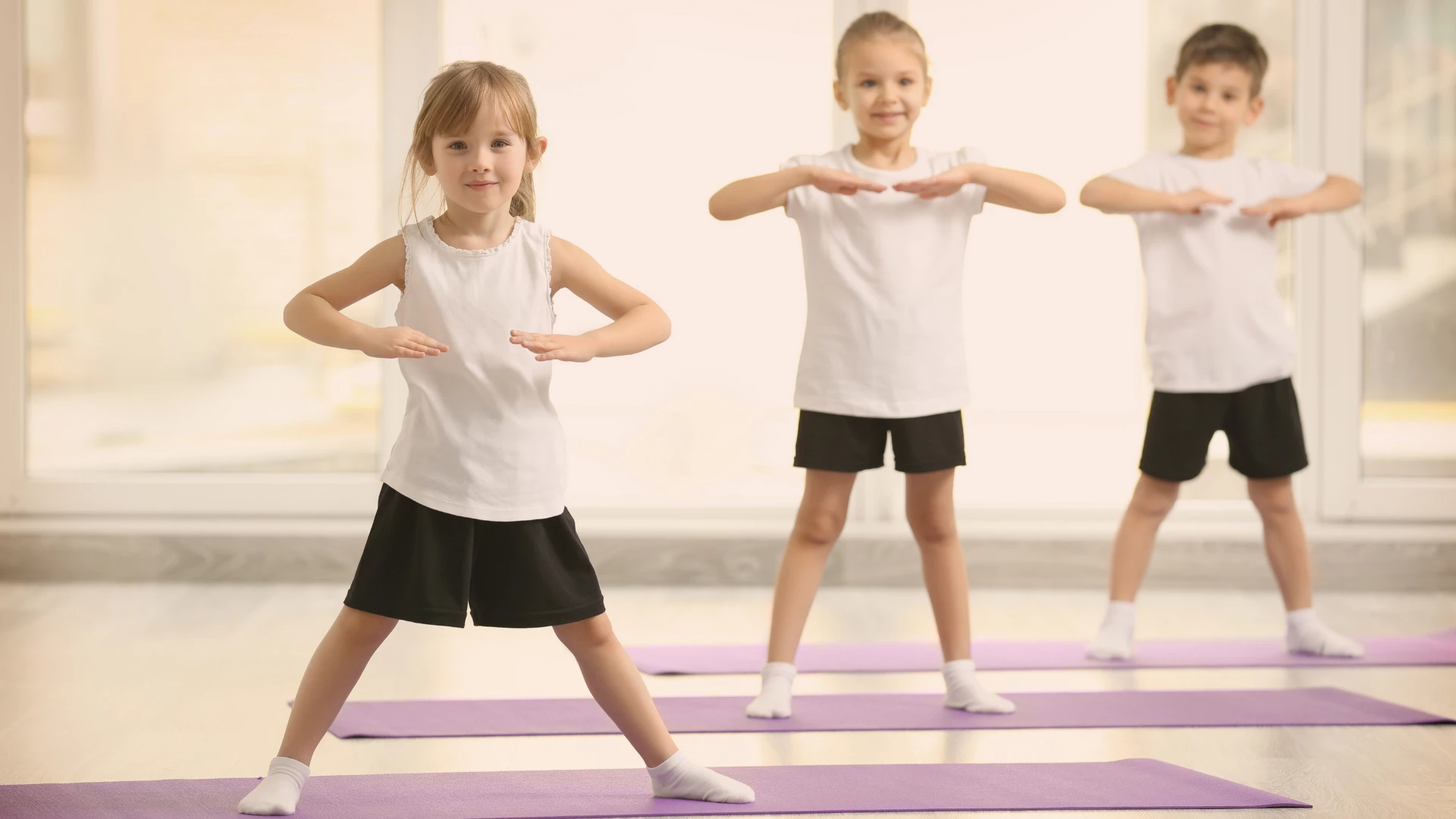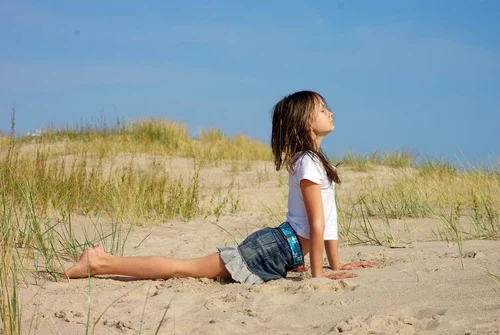Yoga for Children with Autism – Keys to Helping Kids Navigate Challenges

Many children with autism, ADHD, and other special needs face challenges in how their brains and bodies respond to stress. This easily causes them to live in a state of heightened arousal, which can negatively impact health, mood, and behavior.
Research has shown how yoga can help regulate our nervous system, and a recent study revealed that yoga offers a particularly calming influence for children with Autism Spectrum Disorders: the 2012 study found that the children who participated in a yoga routine had significant decreases in behavioral issues as compared to the control group.
In this interview, Shawnee Thornton Hardy, a children’s yoga instructor, special educator, and behavioral specialist, sheds light on how we can bring the healing benefits of yoga to neurodiverse children. Shawnee has spent the past 20 years working with kids with special needs. She is the Founder of Asanas for Autism and Special Needs and the Founder/Director of Yoga Therapy for Youth Certification Program and the author of Asanas for Autism and Special Needs – Yoga to Help Children with their Emotions, Self-Regulation and Body Awareness.
YogaUOnline: We’re seeing with the rising rates of autism in the country today. Can you give us some insight into why we might be seeing this increase?
Shawnee Thornton Hardy: It is true that we have seen a significant rise in the rates of autism. In fact, currently one in forty children in the US is diagnosed with autism. And there are a lot of theories behind this rise in the rate of autism, but I’m not going to go into that because we really don’t know. But one thing that I can say, speaking as someone who’s been in this field for over twenty years now, is that we have a lot more awareness. The world is much more aware of autism now. There was a time where no one had an understanding and many children were not being diagnosed or given support. We’re seeing a big shift and change in that.
YogaUOnline: On the topic of support, one thing that people often talk about is how key early intervention is. How do you see yoga fitting into that?

Shawnee Thornton Hardy: Early intervention is incredibly important. We want to offer children self-coping, self-regulation tools as early as possible. Of course, we want all children to have these tools, but also specifically children with autism and ADHD because they do tend to have a lot of challenges that they face.
They often experience heightened levels of anxiety and frustration. And we want to give them these tools to be able to navigate the world and to face these challenges that we know they’re going to face throughout their lives. There’s not a cure for autism, there’s not a cure for ADHD.
But if we can provide these kids with these tools early on, they’ll be better able to navigate their challenges, enjoy more success and feel a lot more comfortable in navigating and moving through the world.
YogaUOnline: I know you’ve worked with a lot of different children with a variety of different special needs. Could you talk a little bit about the role of yoga in this work?
Shawnee Thornton Hardy: A big majority of my work throughout the years has been working with children with significant behavior challenges: autism, ADHD, down syndrome, cerebral palsy, learning disabilities or challenges with learning. What I’ve found—and this is really why I do the work that I do–is that yoga supports these children in developing self-regulation skills.
These were children that struggled with being in the classroom environment. And unless we have the ability to self-regulate, we don’t have the capacity to learn. We have to address children’s nervous systems first; we have to address their capacity and ability to self-regulate before we can expect them to learn. We need to help them feel a sense of safety in the world around them before we can expect them to learn.
Yoga has been a powerful tool in my own life: I had a lot of trauma as a child. I had a lot of anxiety growing up and really struggled with that. When I found yoga, it was a saving grace for me. I had been working with children for many years and working as a behavior specialist, but when I started to integrate yoga and breathing and movement with the children, it was incredible. I was amazed at how they responded to it: they loved it. They just wanted to do it all the time. They asked for it all the time. And so I began to integrate it.
YogaUOnline: What kind of results did you see in the kids when you introduced yoga?
Shawnee Thornton Hardy: I found that students were more regulated. I found that they were more focused. I found that they were learning a lot of the deeper yogic philosophy about taking care of themselves–respecting themselves and loving themselves. And respecting and taking care of others, too.
I think one of the most important things yoga can teach us is self-acceptance. It’s about being who you are with however your brain functions or however your body functions and feeling valued as a person. Feeling that you have purpose in the world. I really saw yoga impact the kids in this way, and that’s really been my driving force in sharing this work.
YogaUOnline: And as you’ve said in your course, that’s something that’s not just for the kids we label as “special needs.” That’s something that can benefit all children–adults too, really–or as you were talking about in your own case, those with trauma.
Shawnee Thornton Hardy: Trauma is a big one. For many of the children I work with, their learning was greatly impacted by severe trauma they experienced early on in their lives. As a result, they were in a survival fight/flight/freeze mode because they had to be in that survival mode. And in my opinion, children with autism, children with ADHD, children who are hypersensitive to the world around them are also experiencing their own sense of trauma, regardless of their background.
There’s a level of trauma that all these children have experienced just from existing in their bodies in this world. It’s important to keep that in mind and recognize the importance of creating a safe environment for them. Our role is to help them learn how to feel safe in their own bodies and feel safe in the world around them.
YogaUOnline: That’s beautiful. And that reminds me of something you say in the course, where you were talking about how we want to connect to the whole person and not just some itemized list of needs or symptoms.
Shawnee Thornton Hardy: Yes, and I think that’s so important for us to really recognize that we’re not trying to fix children through the practice of yoga and breathing, that children don’t need to be “fixed.” What we’re trying to do is support them. There is this inner light that children carry within themselves that’s so beautiful. I think that’s why I’ve been drawn to this work.
I just believe children are these very spiritual beings that have this beautiful light inside. And it’s our job to help them shine that light brightly to help support them in being themselves. They’re already whole, they’re already beautiful. It’s important to understand that we’re not coming in and trying to fix children and that the practice of yoga is not about fixing. It’s about acceptance and self-love and self-compassion and compassion for others.
It’s not a practice to fix something. It’s not a practice to cure something. It’s a practice to enhance these kids’ unique strength and the skills that they already have, and to bring those out.
We know through research that there are immense benefits yoga provides for our mental, emotional and physical health and wellbeing. Yoga helps reduce stress and tension, it helps us to be in more of a place of calm. It supports our digestive system, our immune system, our respiration. It strengthens the core and strengthens and stabilizes the muscles in the body that support posture, motor coordination, and movement.
So this practice impacts our mental, emotional, social, and physical wellbeing on all layers and all levels. It’s not a practice to fix something. It’s not a practice to cure something. It’s a practice to enhance these kids’ unique strength and the skills that they already have, and to bring those out. It’s to support these children enjoy improved health and wellbeing and to feel more grounded and connected to the world.
And it’s not just in this moment as we give these children these tools. These are lifelong practices. When we give them a love of yoga and mindfulness, they can be healthier individuals as they grow into adults.
YogaUOnline: Having seen inside of your course, I can just say how absolutely wonderful a job you have done with taking all these principles of yoga and making them accessible for children with special needs, making them accessible for all children. There are so many different strategies, so many different tools, such fun angles on so many familiar poses and breathing techniques. I just think you’ve done a wonderful job and I want to thank you for your work in the course, and also for the work that you’re doing in general and what you’re giving to the world.
Shawnee Thornton Hardy: Thank you so much. This is really my passion. My passion is that all children and adults really feel included and have access to these practices of yoga and mindfulness. And we can share these practices: we just have to seek out the key information and learn teaching strategies and have awareness.
It is so important for all children to feel included and to have access. It’s my pleasure and honor to share, and I’m grateful every time I get the opportunity to share my heart’s work. Thank you so much for inviting me and giving me this opportunity to share.


